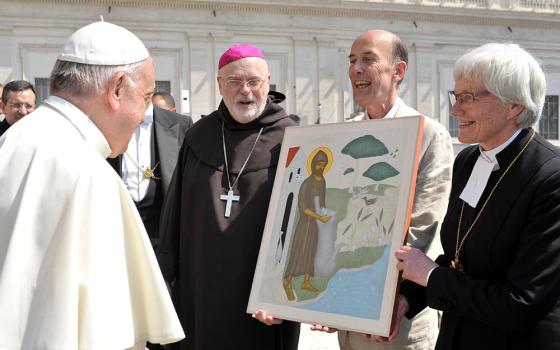Speaking on the steps of a federal courthouse Monday in Denver, the mother provincial of the Little Sisters of the Poor said the religious order cannot and "should not have to" choose between "our care for the elderly poor and our faith."
Sr. Loraine Marie Maguire said that is what the U.S. government is demanding by requiring the order to comply with the Affordable Care Act's contraceptive mandate.
"It is a choice that violates our nation's historic commitment to ensure that people from diverse faiths can freely follow God's calling in their lives," she said in a statement. "But the government forces us to either violate our conscience or take millions of dollars that we raise by begging for the care of the elderly poor and instead pay fines to the IRS."
She made the comments after the 10th U.S. Circuit Court of Appeals heard oral arguments in an appeal filed by the Little Sisters of the Poor and in two related cases, Southern Nazarene University in Denver and Reaching Souls International, an Oklahoma nonprofit.
Mark Rienzi, senior counsel of the Becket Fund for Religious Liberty and lead attorney for the Little Sisters, delivered the oral arguments on behalf of the order. Adam C. Jed, an attorney with the U.S. Department of Justice, delivered the oral arguments on behalf of the U.S. Department of Health and Human Services, headed by Secretary Sylvia Mathews Burwell.
"Untold millions of people have managed to get contraceptives without the involvement of nuns," Rienzi said in a statement afterward. "The idea that the most powerful government in the world cannot come up with a way to distribute these products without forcing the Little Sisters to participate is ridiculous."
A Catholic News Service request for comment from HHS was not immediately returned.
The Little Sisters of the Poor first filed suit against the HHS mandate in September 2013 in U.S. District Court for the District of Colorado and lost.
The order appealed the decision to the 10th Circuit. Last December, the U.S. Supreme Court granted the religious order a temporary injunction on enforcement of the mandate and now the order seeks a permanent injunction.
The Little Sisters of the Poor, a Denver-based religious order that cares for the elderly poor in several facilities around the U.S., has been steadfast in its refusal to provide contraceptive coverage to its employees as required by the U.S. Department of Health and Human Services under the Affordable Health Care Act.
Refusal to comply with the mandate may force the Little Sisters to pay millions of dollars in fines to the federal government. The fine is set at $1,000 a day per enrollee in an employer's health plan.
HHS requires nearly all employers to cover contraceptives, sterilizations and some abortion-inducing drugs for all employees in company health plans. It includes a narrow exemption for religious employers that fit certain criteria.
To opt out, nonexempt religious employers must inform the government of its religious objections to the mandated coverage. The government then informs a third party -- such as the employer's insurer or the administrator of its plan -- that it must provide the coverage at no cost to the employee.
Nonexempt employers, like the Little Sisters of the Poor, had been required to fill out a self-certification form -- known as EBSA Form 700 -- to direct a third party to provide the contested coverage.
Many religious employers that have sued over the mandate argue that even filling out Form 700 makes them complicit in providing coverage they find objectionable.
So last August, the Obama administration issued revised rules, which religious employers say they still find objectionable.
Under the new procedure, an eligible organization must advise HHS in writing of its religious objection to contraception coverage.
HHS itself will then notify the insurer for a health plan, or the Department of Labor will notify the third-party administrator for a self-insured plan, that the organization objects to providing contraception coverage. The insurer or third-party administrator must provide the coverage at no cost to the employee.
When the new rules were released, an HHS statement said they "balance our commitment to helping ensure women have continued access to coverage for preventative services important to their health, with the administration's goal of respecting religious beliefs."
In her statement, Maguire said her order is "not seeking special privileges."
"The government exempts huge corporations, small businesses, and other religious ministries from what they are imposing on us -- we are simply asking to carry on our mission to serve the elderly poor as we have always done for 175 years," she said.



